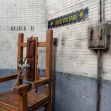On Thursday, the U.S. Supreme Court upheld the conviction of a federal prisoner despite subsequent changes in the law rendering his conviction invalid. The ruling prevents inmates from seeking federal review of a conviction, even an unlawful conviction, if they already sought federal relief in the past.
In 2000, Marcus Jones was arrested and convicted on three federal gun charges, including two counts of “unlawful possession of a firearm by a felon.” He was sentenced to nearly 30 years in prison. Nineteen years later, the Supreme Court ruled in Rehaif v. United States that defendants cannot be convicted on felon-in-possession charges unless they actually knew they had a felony conviction at the time they possessed a gun.
Jones argued that he sincerely, albeit erroneously, believed that his prior felony conviction had been expunged before he acquired a gun. When he was arrested and convicted in 2000, the government did not need to prove the knowledge element. Under Rehaif, therefore, his conviction should be invalidated; if the government cannot prove he knew he had a felony conviction, then he’s not guilty of a crime.
Before Rehaif, however, Jones challenged various parts of his conviction and sentence in federal court. He was successful, in fact, in convincing a federal court to vacate part of his sentence.
Normally, inmates are given one chance at post-conviction relief under 28 U.S. Code § 2255. Section 2255 includes a few exceptions, however, which permit an inmate to challenge their conviction more than once where section 2255’s usual process “is inadequate or ineffective to test the legality of his detention.”
Jones argued that he should be permitted a second challenge because he could not have known before Rehaif was decided that he had a potential argument for actual innocence. Justice Thomas, delivering the Court’s 6-3 majority opinion, disagreed.
The majority opinion construes this “inadequate or ineffective” language very narrowly. In essence, Thomas contends that the language is limited to an inability to challenge the conviction in the original court where the defendant’s case was held because of some practical difficulties, such as if Congress later eliminated that court or the defendant cannot physically travel to that court. Even if changes to the law would invalidate a conviction--even if an inmate could convincingly prove they committed no crime at all--, if they’ve already gone through the section 2255 process, they do not get a second chance. According to Justice Thomas, “Congress has chosen finality over error correction in his case.”
In a 39-page dissent, Justice Ketanji Brown Jackson argued that Thomas’s opinion is divorced from the text and Congressional intent. “Nothing in the whole of §2255 suggests that Congress
ever considered the scenario presented in this case—one in which a prisoner who has already filed a postconviction motion suddenly gets a new claim of legal innocence,” she contended, and thus it is “not at all clear that Congress determined that such an individual is simply out of luck.”
Justice Jackson expressed being “deeply troubled by the constitutional implications of the nothing-to-see-here approach that the majority takes with respect to the incarceration of potential legal innocents.” She criticized the majority for “forever slamming the courtroom doors to a possibly innocent person who has never had a meaningful opportunity” to challenge their conviction based on new, retroactively applicable legal arguments. “Apparently, legally innocent or not, Jones must just carry on in prison regardless, since (as the majority reads §2255) no path exists for him to ask a federal judge to consider his innocence assertion.”






